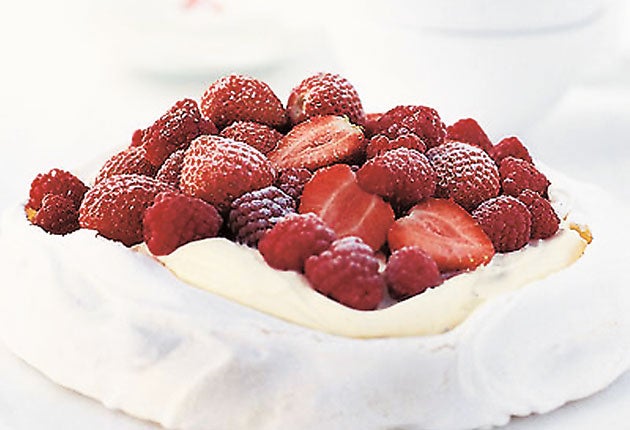Pavlova wars: New Zealand reclaims its national dessert
Prime Minister irritated by Australia's culinary thievery

Your support helps us to tell the story
From reproductive rights to climate change to Big Tech, The Independent is on the ground when the story is developing. Whether it's investigating the financials of Elon Musk's pro-Trump PAC or producing our latest documentary, 'The A Word', which shines a light on the American women fighting for reproductive rights, we know how important it is to parse out the facts from the messaging.
At such a critical moment in US history, we need reporters on the ground. Your donation allows us to keep sending journalists to speak to both sides of the story.
The Independent is trusted by Americans across the entire political spectrum. And unlike many other quality news outlets, we choose not to lock Americans out of our reporting and analysis with paywalls. We believe quality journalism should be available to everyone, paid for by those who can afford it.
Your support makes all the difference.New Zealand's new Prime Minister, John Key, faces a host of diplomatic challenges as he adjusts to the job. But of them all, the one exercising him most at the moment is the weighty matter of the provenance of a meringue dessert topped by cream and tropical fruit.
Mr Key is irritated by Australia's long-standing claim to have invented the pavlova, which he dismissed yesterday as "ridiculous". He urged his neighbour and ally to acknowledge the dessert's New Zealand's origins – and to renounce other treasured New Zealand exports, such as the legendary racehorse Phar Lap, to which Australia also lays claim.
New evidence suggests that where the pavlova is concerned, the conservative Prime Minister may be right.
Australians have long believed it was created in 1935 by a chef called Bert Sachse, at Perth's Esplanade Hotel, in honour of the Russian ballerina Anna Pavlova, pictured, who visited Australia in 1926 and again in 1929.
However, Helen Leach, an academic at New Zealand's Otago University, has found a pavlova recipe in a 1933 Mothers' Union cookbook, and another in a 1929 rural magazine. Both call the dessert a pavlova, stipulate the same ingredients used by modern cooks and recommend the same cooking method.
Historians point out that Anna Pavlova ventured across the Tasman Sea to New Zealand on both her visits.
While Australians consider the dessert one of their national dishes, Mr Key told Australian Associated Press: "It's totally ridiculous for Australians to claim that they have pavlova, or Phar Lap, or any of those iconic New Zealand items. Everyone knows that they're ours and for Australia to claim ownership of them is quite inappropriate."
Phar Lap, a thoroughbred gelding, was born in New Zealand in 1926 but raced in Australia, winning two consecutive Melbourne Cups.
The horse died in mysterious circumstances in the US in 1932 and his body parts are scattered in museums on both sides of the Tasman Sea.
Australians also claim as theirs the temperamental Oscar-winner Russell Crowe, who was born in New Zealand but moved to Australia with his family at the age of four. Mr Key joked that "on a bad day, we'll lend you Russell Crowe".
While many New Zealanders resent Australia's habit of appropriating anything or anyone famous to emerge from their country, trans-Tasman rivalries are generally light-hearted.
The former New Zealand prime minister, Robert Muldoon, once quipped that "New Zealanders who emigrate to Australia raise the IQ of both countries". Asked about that comment, Mr Key replied: "It would be most impolite of me to confirm or deny that proposition."
An Australian television personality, Rove McManus, raised hackles in New Zealand recently when he described the country as "the cousin at the party with the short trousers".
Mr Key said: "We're always going to be the little brother, but a little brother that can play rugby well."
In fact, as Australians gleefully point out, New Zealand can no longer rely on its once all-conquering All Blacks to uphold national pride. The team has not won the World Cup since the inaugural championship in 1987, while Australia has triumphed twice.
Mr Key, who ousted Helen Clark in a general election last November, admitted that, despite their niggles, Australia was New Zealand's most trusted ally.
And he said the Kiwis were ready to forgive Australia for Trevor Chappell's infamous underarm bowl in 1981 which prevented the New Zealand batsman from hitting a six to tie a one-day match.
"We've certainly stopped the counselling sessions," he said.
How to make the perfect pavlova
*Preheat an oven to 150C (300F).
*Whisk five egg whites into stiff peaks, adding 225g caster sugar and a pinch of salt.
*Fold in two teaspoons of cornflour and one teaspoon of vinegar. Then spoon the mixture on to a baking sheet, or into a lined cake tin.
*Cook for 45-60 minutes.
*Whip 275ml of double cream with a teaspoon of Kirsch. When the pavlova is cool, top with the cream, soft fruit (such as raspberries and strawberries), sugar and serve.
Join our commenting forum
Join thought-provoking conversations, follow other Independent readers and see their replies
Comments